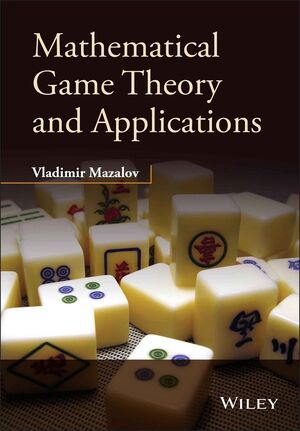|
Welcome to the companion website for Mathematical Game Theory and Applications. This website gives you access to the resources available for the book.
About the author:
Vladimir Mazalov, Research Director of the Institute of Applied Mathematical Research, Karelia Research Center of Russian Academy of Sciences, Russia
Professor Vladimir Mazalov is a well-known scientist in applied mathematics, stochastic analysis, game theory, and its applications. He is the author of 100 articles and five books in Russian and English. He was born in the Ural region in Russia, educated at the Leningrad (Sankt-Petersburg) University in 1976, in the department of applied mathematics and processes of control, where he gained a PhD in 1980. After that he has mainly worked in research projects funded by the Russian Academy of Sciences, in 1980–98 in the Chita Institute of Natural Recourses, East Siberia and, currently, in the Institute of Applied Mathematical Research, Karelia Research Center of Russian Academy of Sciences. He is the research director of the Institute and the professor of the probability theory department of Petrozavodsk State University. He was supervisor of 15 PhD students. He is an Editor of the journal
International Game Theory Review, Scientiae Mathematicae Japonicae and International Journal of Mathematics, Game Theory and Algebra.
About the book:
This book introduces a new and original approach to the description of the foundations of game theory. The approach to the presentation of material in this book differs from conventional ones. We intentionally avoid giving a detailed treatment of matrix games, as they are described in many publications. Our study begins with non-zero-sum games and the fundamental theorem on equilibrium existence in convex games. Later on, this result is extended to the class of zero-sum games. The discussion covers several classical models used in economics (the models of market competition suggested by Cournot, Bertrand, Hotelling, and Stackelberg, as well as auctions). Next, we move from normal-form games to extensive-form games and parlor games. The early chapters of the book consider two-player games, and further analysis embraces n-player games (first, non-cooperative games and then cooperative ones). Subsequently, we provide fundamental results in new branches of game theory, best choice games, network games, and dynamic games. The book proposes new schemes of negotiation and attention is paid to arbitration procedures. Mathematical Game Theory and Applications will be useful for students specializing in applied mathematics and informatics, as well as economical cybernetics. Moreover, it will attract the mutual interest of mathematicians operating in the field of game theory and experts in the fields of economics, management science, and operations research. Each chapter concludes with a series of exercises intended to achieve a better understanding. Some exercises represent open problems that invite independent investigation. It is one of the main intentions of this book in fact, to stimulate the reader to carry out their own research.
"It is really not trivial: start with solving parlor games and optimal cutting the pie, use the ideas of found solutions for mechanism design of negotiations and then switch to resource allocation and other real life problems."
- Leon Petrosyan
|





